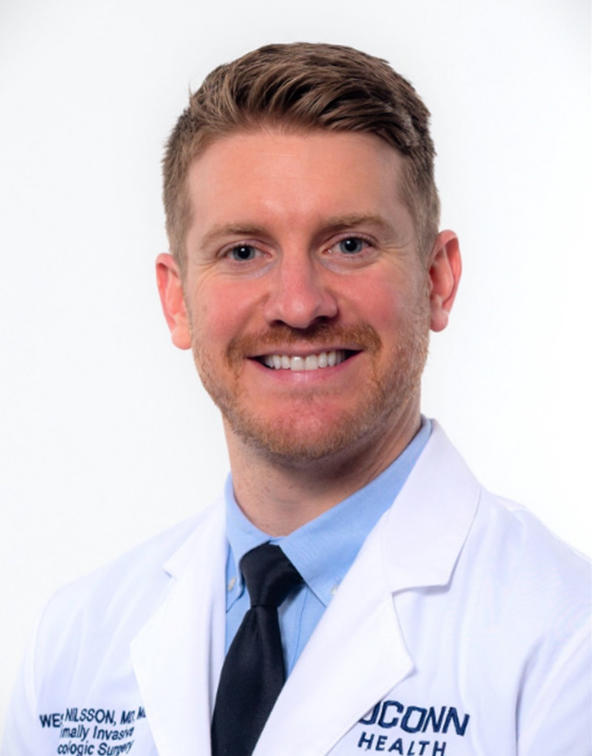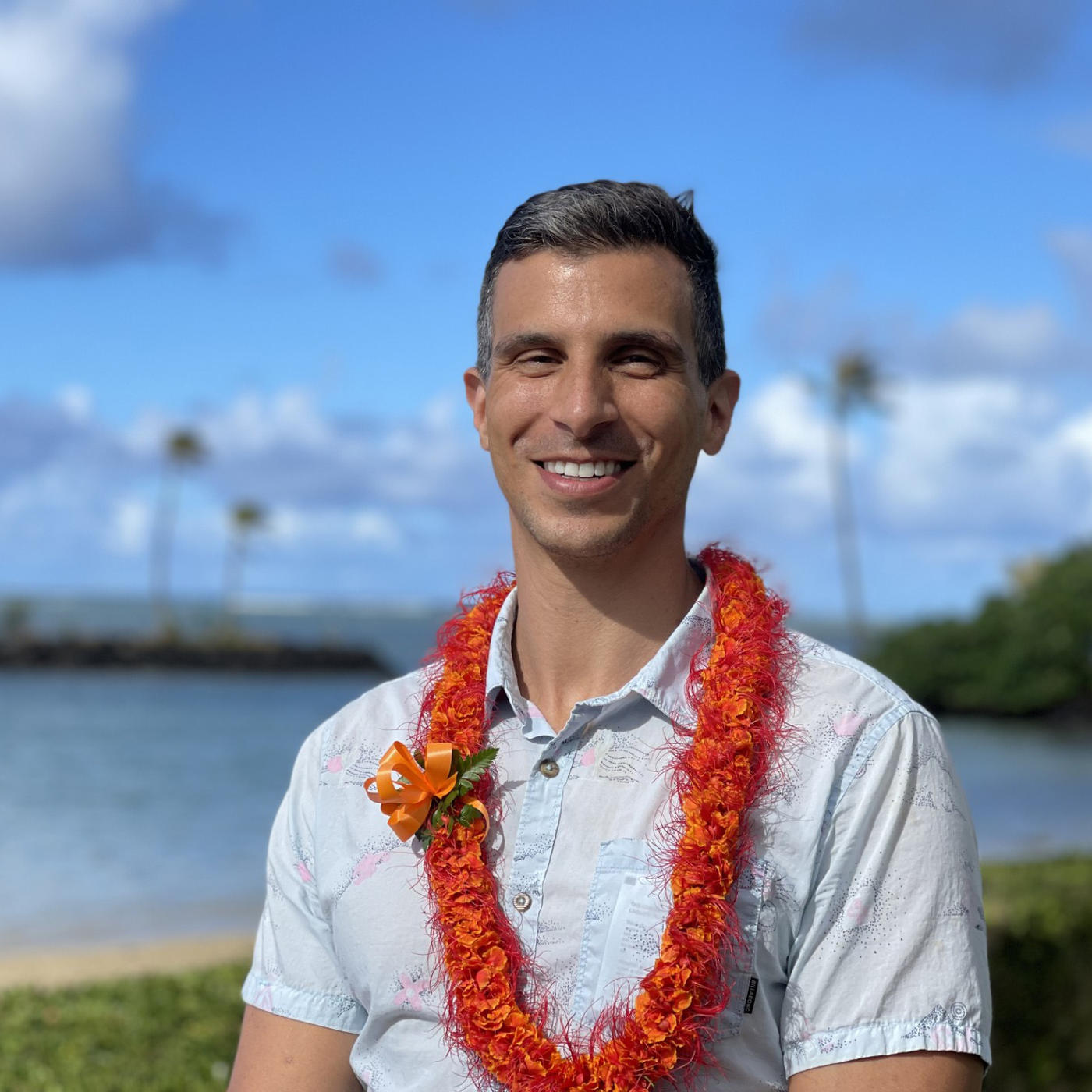Dr. Wesley Nilsson is an obstetrician gynecologist (OB/GYN) and board certified fellow of the American Congress of Obstetricians and Gynecologists (FACOG). He graduated from American University of the Caribbean School of Medicine (AUC) in 2017 — and hasn’t slowed down since. We caught up with Dr. Nilsson between his Minimally Invasive Gynecologic Surgery (MIGS) Fellowship at the University of Connecticut School of Medicine and his work as a locum tenens physician (a temporary doctor who fills in as needed) about an hour away at Bridgeport Hospital. He was kind enough to answer questions about his educational path and expound on the experience of getting a Doctor of Medicine (MD) degree from AUC.
Q: How did you end up going to medical school at AUC?
Dr. Nilsson: My first attempt at medical school was riddled with denials and defeat. I was told several times that I needed a little more “life experience.” I took that advice to heart, graduated from college, buckled down, and got two jobs — one at a hospital and the other (part time) at a gym. I only worked a few months in the hospital, but every single day I knew that the choice I was making, to become a doctor, was the right one. I had a strong drive and decided I wasn’t going to listen to the folks that told me I was “too young” or didn’t have enough “life experience.” I craved becoming a physician and ended up finding AUC. AUC had a January start [as well as in May and September], and I was eager to begin. The rest is history.
Q: What did you enjoy most about studying in Sint Maarten, the home of AUC?
Dr. Nilsson: I had a lot of friends going through the medical school experience at the same time as I did. Many of them were in medical schools throughout the United States, and let me tell you, our post-exam beach outings in Sint Maarten were unbeatable compared to what they were able to do back in the States. Sint Maarten is unbelievably beautiful, and to this day it feels unreal that I lived there for two years.
Q: Do you keep in contact with AUC classmates or faculty?
Dr. Nilsson: Some of my best friends were made on that island, and we remain great friends today! The rigors of medical school bond you, and the experience of living together on an island created some wonderful memories and moments for us. We of course got close to some of our faculty, as they are such powerful mentors, and they really set the foundation for your entire career. Shout out to [former AUC Professor of Clinical Medicine] Dr. Bill Hayden, who was an immense mentor for me (and even made it to my wedding stateside!), as well as Mr. Andy Heeps (my OB/GYN attending physician during clinical rotations), who absolutely made the biggest impact on my OB/GYN career.
Q: What sparked your interest in becoming an OB/GYN? Was there any hesitation to enter that field because of your gender?
Dr. Nilsson: When I started medical school, I was going to be a cardiologist. No question about it. As I progressed through the basic sciences, I was still hooked on cardiology, and I loved the physiology and pathology of it all. We moved on to clinical rotations, and I eagerly awaited my cardiology block. Then it came, and it went. I felt no passion for it, and I was shocked. I moved on to my OB/GYN rotation, but thinking it was not in my future, I showed up with few expectations. Day one started with a morning operating room procedure followed by a fast-paced afternoon clinic, and then ended with delivering my first baby. I cannot overstate how hooked I was from that day. Mr. Heeps treated me with such respect and held me to such a high standard that it truly shaped my medical career.
I also had a fear of becoming an OB/GYN as a man, but I have come to learn that patients only want a good doctor. There may be some initial hesitation, but after a patient learns that you are dedicated, compassionate, and willing to fight for them, nothing else matters.
Q: What sparked you to earn your MD degree as you also pursued a Master of Business Administration (MBA)? That’s quite a workload!
Dr. Nilsson: My dad immigrated to the United States from Sweden when he was young. As I grew up, I witnessed how hard work and passion can lead to a blossoming career. He was — and still remains — a great role model for me. But his career is all business, and I saw, over several years, how business was important to any field, especially medicine. I knew that regardless of what my future looked like as a physician, I was eager to become a leader in it. I knew understanding the business side was going to be just as important one day as my medical knowledge.
Q: You didn’t stop there, either. You went on to earn a master’s certificate in clinical and translational research as you began your current fellowship — all while serving as a locum tenens physician, publishing articles, and participating in a host of other activities. How do you do so much at one time?
Dr. Nilsson: I wish I could say that I was gifted and had a natural talent for medical knowledge or studying or taking exams. The real secret is surrounding yourself with the right people. Medical school is extremely hard and you need a good support system. Residency is no easier, and the support system remains crucial. I work hard, but without my wife, family, friends, and mentors, I wouldn't be where I am today. They push me and keep me sane all at the same time, so when opportunities arise to better myself, I take them.
Q: Do you have an ultimate career goal — other than keeping yourself terribly busy?
Dr. Nilsson: I’ve found my passion, and I would argue with anyone how much better my job is than theirs. (Give it your best shot!) But this medical system I’ve found myself entwined in, it needs to be fixed. Women's health has so much room to make big strides and see enormous improvement. Medical access, research, cost, and experience is in dire need of fixing, and while I certainly cannot do it alone, I hope to be a positive force in improving the lot of it.
Q: Will you ever settle down and say, OK, now I can relax?
Dr. Nilsson: I might slow down, but it would go against my very core to come to a full stop.
Q: Finally, do you have any advice for young medical students?
Dr. Nilsson: This journey has been a lot of what I expected it to be, but a lot more of what I didn’t. I could write essays of advice for medical students, but the purest thing I can pass on is to be courageous. Courage means to live and lead with your heart, and you owe it to yourself and others to do just that.
To acquaint yourself with a bit of Dr. Nilsson’s expertise on women’s health, check out this Q&A session on endometriosis and polycystic ovary syndrome (PCOS), topics relevant to every woman — particularly those of reproductive age.
At AUC School of Medicine, we’re training future obstetrician gynecologists (OB/GYNs) and other specialist physicians. Our 2023–2024 MD graduates achieved a 98% first-time residency attainment rate* and are now beginning their post-graduate training across 22 specialties. Learn more about AUC and our Medical Sciences curriculum, as well as the requirements for admission. Thank you, Dr. Nilsson, for sharing some of your fascinating personal history!
*First time residency attainment rate is the percentage of students attaining a 2024–25 residency position out of all graduates or expected graduates in 2023–24 who were active applicants in the 2024 NRMP match or who attained a residency position outside the NRMP match.





